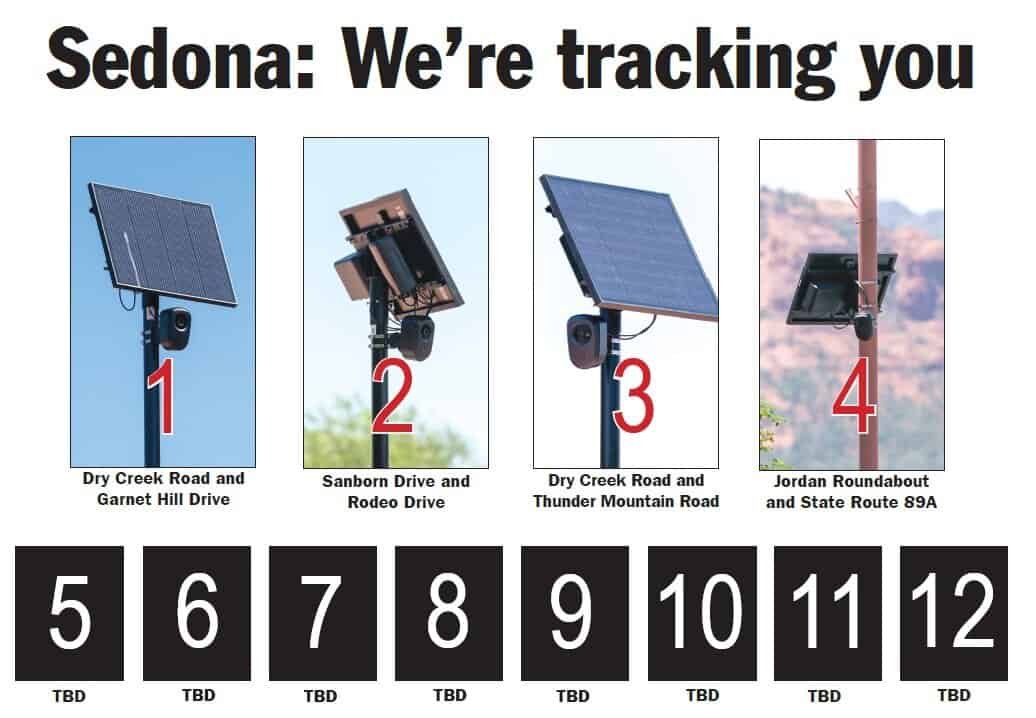Editorials & Opinions
Sedona’s Surveillance Cameras: A Growing Danger to Our Privacy Rights

Sedona is facing scrutiny over its decision to install automated license plate readers (ALPRs) throughout the city. This development has drawn parallels with surveillance practices seen in countries like North Korea and China. Critics argue that this system serves to monitor law-abiding citizens, raising concerns about privacy and civil liberties.
The city’s choice to deploy these cameras occurred with minimal public discourse. Aside from brief mentions during budget meetings, residents received no advance notice or opportunity for public debate before installation. A single Facebook post addressing residents’ backlash appeared two weeks later, a response many deemed inadequate. The city has yet to clarify the motivations behind implementing such surveillance measures.
Local residents expressed their discontent, questioning the necessity of tracking movements without evidence of a crime wave. There have been no recorded demands from community members for such invasive technology, raising critical questions about the allocation of tax dollars to combat an assumed problem. A free society thrives on individual privacy, a foundational element threatened by the introduction of mass surveillance.
ALPR technology indiscriminately collects data on countless vehicles, creating expansive databases that could expose personal habits, associations, and private locations—from medical appointments to protests. With data continuously amassed without warrants, the nature of policing begins to resemble a totalitarian monitoring system. The city justifies the surveillance as lawful, yet simultaneously restricts the disclosure of camera locations, prompting skepticism regarding its claims.
Many cite the chilling effect that surveillance has on lawful activities. The mere knowledge of monitoring can deter individuals from exercising their rights and diminish public trust in law enforcement. Proponents of the technology assert that law-abiding citizens have nothing to fear, yet inaccuracies in ALPR data can lead to wrongful stops and a misrepresentation of innocence as guilt.
Evidence supporting the effectiveness of ALPRs in preventing crime remains scarce. While they may assist in specific contexts, such as vehicle theft, the broader impacts on violent crime are negligible. When pressed for statistical support for the ALPR initiative, Sedona’s Communications Director provided only anecdotal accounts, leading to further skepticism about the program’s rationale.
The implications of such surveillance are profound. Concerns over “mission creep” suggest that initial justifications for ALPR technology will expand to track other perceived threats. Public spaces, while subject to some observation, should not be converted into zones of constant surveillance, fundamentally altering the social contract between citizens and government.
Legal experts argue that the extensive collection of data constitutes a search under the Fourth Amendment, necessitating a warrant. The city’s plan to retain this data for 30 days intersects with recent rulings from other jurisdictions emphasizing the importance of privacy in surveillance matters.
With no governing laws on ALPR usage in Arizona, a private company, Flock Safety, is responsible for managing the data collected. This raises additional privacy concerns, as Flock operates without the same constitutional safeguards that public entities must adhere to. The potential for data misuse or breaches is significant, threatening not just local residents but countless individuals nationwide.
The Sedona City Council has faced allegations of lacking transparency. Critics question why the installations occurred without prior engagement or public meetings, and whether the council aims to obscure the implications of these surveillance practices. Residents are encouraged to ask questions and demand accountability regarding this policy shift.













![Phillip Gracia was arrested on multiple disorderly conduct charges on June 19, 2025. [PCSO/graphic]](https://arizonanews.org/wp-content/uploads/2025/06/Family-Mass-Suicide-Plot-Man-Arrested-for-Alleged-Orchestration-80x80.jpg)




